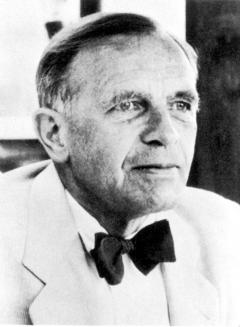We live in an age of unprecedented abundance but even in that abundance there are pockets of poverty, addiction, and despair. There are no easy answers to our social problems. They require individual freedom to pursue and implement creative entrepreneurial solutions and virtue to align those energies into ventures oriented toward service to others. Sound economic thinking is required and many people, including those with political power and influence, turn to economists for solutions to the problems of modern life. This public confidence in economists has its own dangers as the Nobel laureate Friedrich Hayek once warned that “the economist who is only an economist is likely to become a nuisance if not a positive danger.”
No economist was so acutely aware of what a dangerous game he was playing as Wilhelm Röpke (1899–1966). It was in the trenches of Europe during World War I, where he and so many men of his generation fought what H. G. Wells ironically called “the war that will end war,” that Röpke dedicated himself to what would become his life’s work:
To understand the reasons for the crisis, to learn what brought it to the stage of war, and to find if war indeed resolved anything, I determined to become an economist and a sociologist. Like all who are young, much of my curiosity must have been for its own sake, but since from the first my studies were directed toward the prevention of the thing I studied, a moral imperative lay behind them.
Even at this early stage of inquiry, Röpke saw his project in holistic terms involving intersecting and interdependent spheres or orden that to be fully appreciated and understood scientifically must be examined in their economic, social, and moral dimensions. The combined commitments to mainline economic analysis, the importance of social institutions, and the moral and religious framework of what Röpke calls the “classic-Christian heritage” makes him a unique figure in the history of economics. As such he was ideally suited to avoid the dangers of economic reductionism, embodying the maxim: “life is economic; economics is not all of life.”

It may be precisely on account of these strengths that Wilhelm Röpke, born in Germany and spending much of his later life in Switzerland, has been neglected in the present mainstream of the economics profession. Increasing specialization, reductionism, and “mathiness” in academic economics is antithetical to Röpke’s interdisciplinary and humanistic approach. While he was widely read and influential in his own day in the academy, the public square, and both classical liberal and conservative movements in Europe and the United States, since his death in 1966 Röpke’s thought has been neglected until recently. There has been a recent revival of interest in Röpke among scholars of the history of economic thought that could serve as leaven to lift mainstream economics out of its present malaise.
The Acton Institute’s newest publication, The Humane Economist: A Wilhelm Röpke Reader was designed to introduce the contemporary reader to Wilhelm Röpke and his work exploring the nature of the organic social order in its economic, institutional, moral, and religious dimensions.
For Röpke a stable, prosperous, and dynamic market economy is only possible when free persons guided by conscience are animated by a transcendent sense of purpose. They must receive moral formation in family and community, be protected by the rule of law, and enjoy peaceful material and cultural exchange with those of other nations. The conditions of human flourishing are only ever partially fulfilled by bread alone, “Man can wholly fulfill his nature only by freely becoming part of a community and having a sense of solidarity with it. Otherwise he leads a miserable existence and he knows it.”
The place of Christianity in rooting and grounding a free and virtuous society is, for Röpke, paramount. In his essay “Liberalism and Christianity” (1957), he relates a story of how at an early meeting of the Mont Pèlerin Society the discussion took a turn toward the subject of Christianity:
In this circle of technicians, the discussion turned upon the increasing conviction that if we intend to win the battle for freedom, we must pay attention not primarily to supply and demand, but to quite different things; and once the ice was broken, we “hardened liberals” spoke of what Christianity means for freedom—and, inversely, of what freedom means for Christianity. We were conscious that in speaking in the first place as Christians or liberals concerned for freedom and human dignity, we were on common ground: ground we did not share with the enemy.
Röpke, like Lord Acton, posits that the ur-text of classical liberalism is the admonition of Jesus Christ to “render to Caesar the things that are Caesar’s, and to God the things that are God’s” (Mark 12:17). While himself a Lutheran he turns to Catholic Social Teaching as both an inspiration and model for social thought in the modern world. Classical liberals and conservatives recognize themselves to be in a decisive point in the battle for freedom and human dignity. Röpke points them to a distinctly Christian social philosophy as the necessary framework for all that is both essential and enduring in the liberal tradition.
Featured image credit: Hydro/Wikimedia Commons (CC BY-SA 3.0). Image has been cropped.
Portrait image credit: Ludwig von Mises Institute/Wikimedia Commons (CC BY-SA 3.0).




